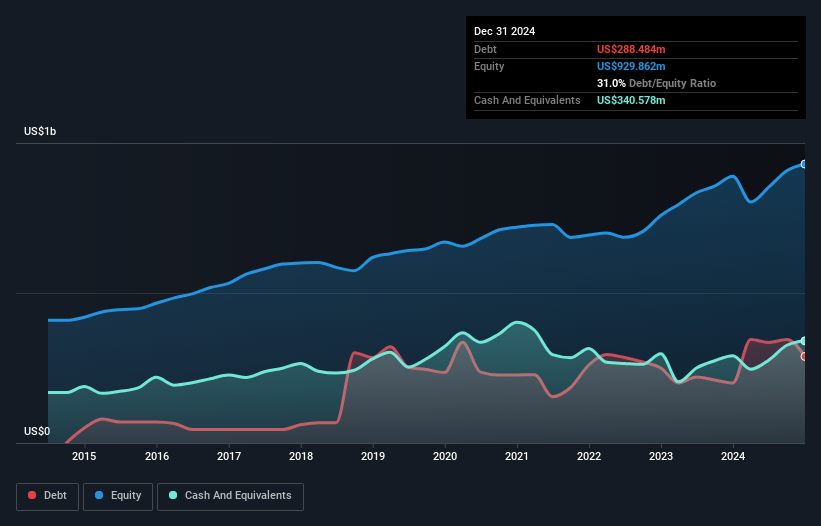
Some say volatility, rather than debt, is the best way to think about risk as an investor, but Warren Buffett famously said that 'Volatility is far from synonymous with risk.' So it might be obvious that you need to consider debt, when you think about how risky any given stock is, because too much debt can sink a company. As with many other companies ExlService Holdings, Inc. (NASDAQ:EXLS) makes use of debt. But the real question is whether this debt is making the company risky.
When Is Debt Dangerous?
Generally speaking, debt only becomes a real problem when a company can't easily pay it off, either by raising capital or with its own cash flow. Ultimately, if the company can't fulfill its legal obligations to repay debt, shareholders could walk away with nothing. However, a more common (but still painful) scenario is that it has to raise new equity capital at a low price, thus permanently diluting shareholders. Of course, the upside of debt is that it often represents cheap capital, especially when it replaces dilution in a company with the ability to reinvest at high rates of return. When we think about a company's use of debt, we first look at cash and debt together.
How Much Debt Does ExlService Holdings Carry?
The image below, which you can click on for greater detail, shows that at December 2024 ExlService Holdings had debt of US$288.5m, up from US$200.0m in one year. But on the other hand it also has US$340.6m in cash, leading to a US$52.1m net cash position.

A Look At ExlService Holdings' Liabilities
We can see from the most recent balance sheet that ExlService Holdings had liabilities of US$290.1m falling due within a year, and liabilities of US$398.4m due beyond that. On the other hand, it had cash of US$340.6m and US$359.8m worth of receivables due within a year. So its total liabilities are just about perfectly matched by its shorter-term, liquid assets.
Having regard to ExlService Holdings' size, it seems that its liquid assets are well balanced with its total liabilities. So while it's hard to imagine that the US$7.29b company is struggling for cash, we still think it's worth monitoring its balance sheet. Succinctly put, ExlService Holdings boasts net cash, so it's fair to say it does not have a heavy debt load!
View our latest analysis for ExlService Holdings
Also good is that ExlService Holdings grew its EBIT at 11% over the last year, further increasing its ability to manage debt. There's no doubt that we learn most about debt from the balance sheet. But ultimately the future profitability of the business will decide if ExlService Holdings can strengthen its balance sheet over time. So if you're focused on the future you can check out this free report showing analyst profit forecasts.
Finally, a business needs free cash flow to pay off debt; accounting profits just don't cut it. While ExlService Holdings has net cash on its balance sheet, it's still worth taking a look at its ability to convert earnings before interest and tax (EBIT) to free cash flow, to help us understand how quickly it is building (or eroding) that cash balance. Over the most recent three years, ExlService Holdings recorded free cash flow worth 72% of its EBIT, which is around normal, given free cash flow excludes interest and tax. This cold hard cash means it can reduce its debt when it wants to.
Summing Up
While it is always sensible to investigate a company's debt, in this case ExlService Holdings has US$52.1m in net cash and a decent-looking balance sheet. And it impressed us with free cash flow of US$222m, being 72% of its EBIT. So we don't think ExlService Holdings's use of debt is risky. We'd be very excited to see if ExlService Holdings insiders have been snapping up shares. If you are too, then click on this link right now to take a (free) peek at our list of reported insider transactions.
When all is said and done, sometimes its easier to focus on companies that don't even need debt. Readers can access a list of growth stocks with zero net debt 100% free, right now.
Have feedback on this article? Concerned about the content? Get in touch with us directly. Alternatively, email editorial-team (at) simplywallst.com.
This article by Simply Wall St is general in nature. We provide commentary based on historical data and analyst forecasts only using an unbiased methodology and our articles are not intended to be financial advice. It does not constitute a recommendation to buy or sell any stock, and does not take account of your objectives, or your financial situation. We aim to bring you long-term focused analysis driven by fundamental data. Note that our analysis may not factor in the latest price-sensitive company announcements or qualitative material. Simply Wall St has no position in any stocks mentioned.